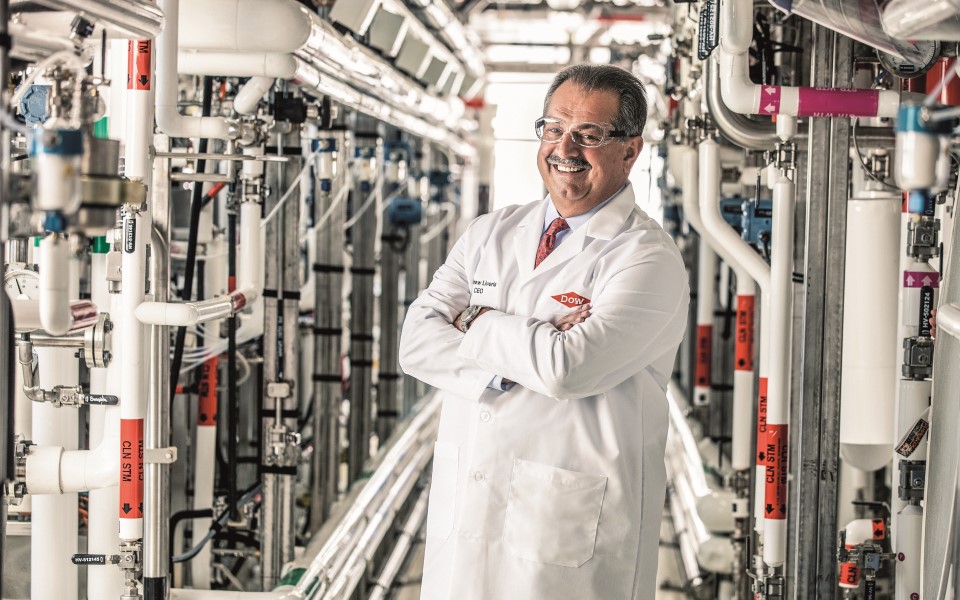Andrew Liveris had first planned to go to Kastellorizo in May. When that proved impossible, he rescheduled his trip for September, but, in the end, the COVID-19 pandemic thwarted his plans. The cherished pleasure of reconnecting with the birthplace of his ancestors has now been postponed until 2021.
But no matter where he finds himself, for Liveris, founder of The Hellenic Initiative and CEO of the multinational conglomerate Dow Chemical from 2004 to 2018, the “Rock,” as the island is affectionately called, is always in his heart and in his thoughts. And that’s why, when I contacted him to request a chance to talk to him about Kastellorizo, he agreed at once.
A telephone interview was scheduled – early morning for me, early afternoon for him in Sydney. I dialed his number and listened as a dynamic voice, which instantly inspired respect and yet at the same time seemed both friendly and familiar, answered from afar.
Like his forebears, Liveris, now 66, has long embraced hard work. A child born into poverty and bereft of his father from the age of 14, he found a father figure in his uncle Lazarus, who pushed him to study and to dream big. Following a somewhat impulsive decision to major in Chemical Engineering at the University of Queensland, Liveris excelled at his studies and landed his first job at Dow Chemical, where he climbed the ladder, rung by rung, to the very top.
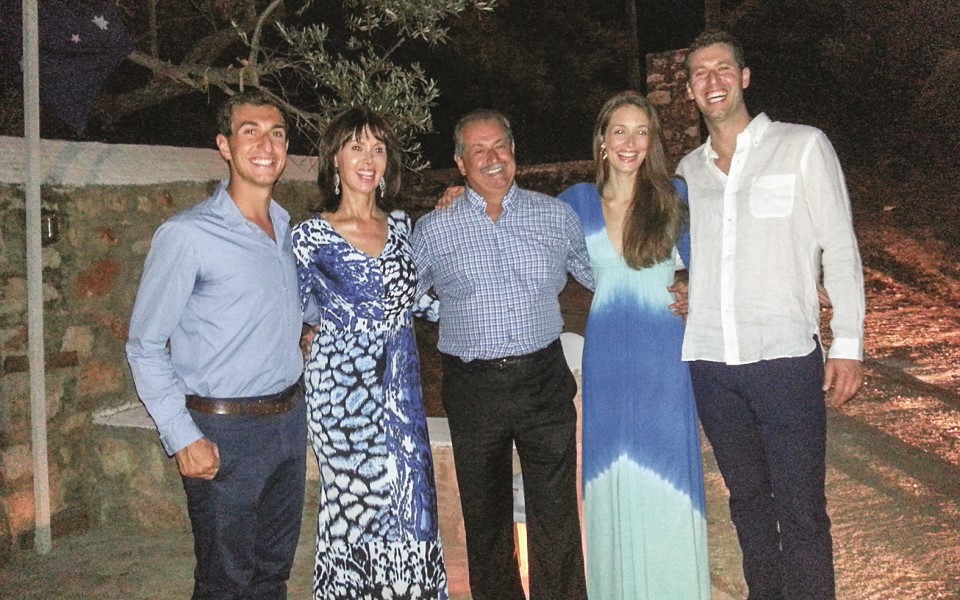
To furnish a full picture of the man, it should be added that he sits on the boards of a number of multinationals, has been called on to advise three presidents of the USA (Trump, Obama, Clinton), the government of Australia and the $250 billion Saudi Arabia Public Investment Fund (PIF), and that his work has seen him establish professional relationships with some of the most powerful people in the world.
A father of three and a devoted husband to his wife Paula for nearly 40 years now, Andrew Liveris is a man who appreciates life’s simple joys far more than the pomp and pageantry his position has so often required him to endure.
Mr Liveris, in recent months we’ve seen tensions rise in Eastern Mediterranean. Were you concerned about Kastellorizo?
The geopolitics of Kastellorizo are centuries old. The island, of course, has always been ethnically Greek, even back in ancient times. To have people act aggressively and possibly threaten Greek sovereignty is not something new, but the difference is that the island doesn’t have so many people living on it now. Most of us who come have roots there through our parents and grandparents, and look at the island with great fondness – it’s our legacy, and many of us have second homes there.
So yes, I am concerned, because the island is lawfully Greek and it will always be; that’s how it is. And I don’t like aggression, either. I am a fan of always doing things diplomatically, although sometimes a lot of noise has to be made before diplomacy can work. That being said, Greece and the EU must never succumb to bullying and bellicose tactics. The actions and behaviors of power-hungry autocrats must be neutralized with firmness. Kastellorizo is, and will always be, Greek.
Why is it important to stay connected with our roots?
I’m a product of immigrants, of courageous but impoverished people. I believe where we come from is, in a sense, who we are and where we are going. I think you prepare your future by using the memories and the lessons from your past. Your history shapes you. We are, after all, creatures of our environment and the legacy we’ve been given is most definitely a large part of our environment, so we have to care about that. A big piece of that is caring about the traditions and the cultural heritage that shaped you into who you are.
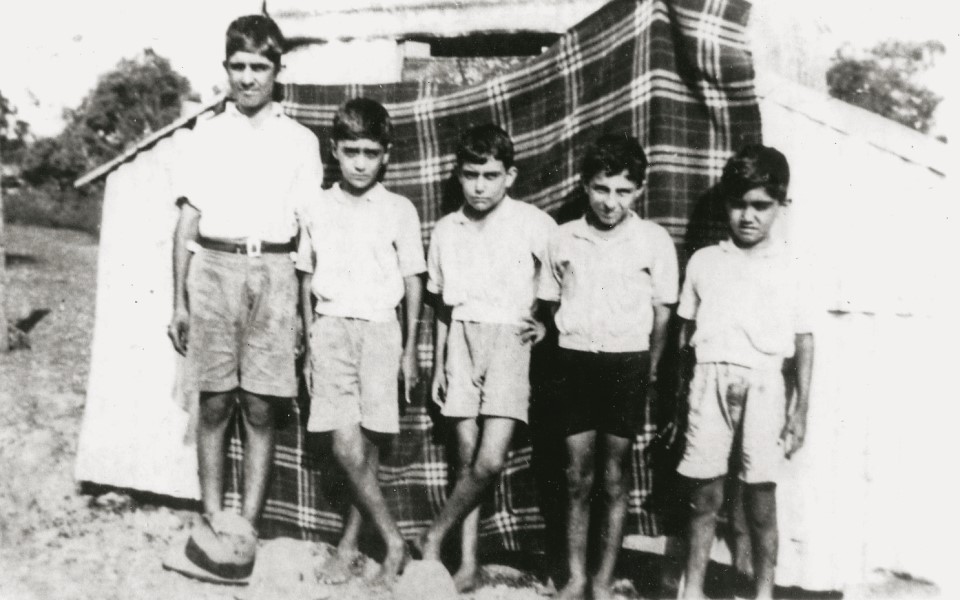
Do you think this idea of heritage, is something rare in today’s globalized world?
In my many decades of work on an international level in the worlds of business, finance, and politics, I’ve found that being a global citizen, is actually the exception to the rule. People are very local, very village-based. We are very tribal, and our communities are important to us, because they connect us to our history and our roots and define who we are as people. Therefore, we find globalism through our people. If you can operate globally by connecting communities, connecting people, this actually is the best goal of globalism. That’s what I do.
My family arrived from one part of the world, Greece and Kastellorizo, I grew up in another part of the world, Australia, and lived in America and Asia, so I’m at ease with all types of people and I’m comfortable with all types of culture. Unfortunately, however, I’m in the minority. There are many more people who didn’t have this opportunity or don’t even think this way. They get stuck in the local way of doing things.
It’s up to people like me to help those people understand that, just because someone looks, acts, and even eats differently, it doesn’t mean they are worse than you. That understanding, that willingness to create a connectivity, is, unfortunately, not common, and this is what gets the world into trouble.
What defines the Kastellorizian spirit and how has it helped shape your personality?
Kastellorizo was a place I’d never visited until I was well into my twenties, but there were two things that I’d heard of and then saw for myself when I finally did visit, things that made it a place I’m proud to call my ancestral home. The first is that, like many other Greek islands, it’s small, and it doesn’t have many resources. The people on the island had to be enterprising, had to find ways to make a life somewhere that, in nearly every respect, is uninhabitable, whether we’re talking fishing or basic farming or even commerce and mercantile trading. Its seeming inability to sustain life makes you appreciate the life that’s there.
The second thing, however, is unique to Kastellorizo. The island has always been the first and last place in terms of travel in and out of Greece, or, for that matter, in and out of the EU. It’s a crossroads. In the ancient times, and even as recently as when the French and Italians occupied it, it was a gateway to the Levant, to another world: the Arab world. Not unlike Constantinople, it was a meeting point of continents. And Kastellorizo, despite its small size, loomed large; it had an impact on that part of the world.
There’s an expression we use in Australia: “It punches above its weight.” And I think that bravado, that strength of character and almost egotistical demeanor makes Kastellorizo and Kastellorizians special. It means we can take on anything.
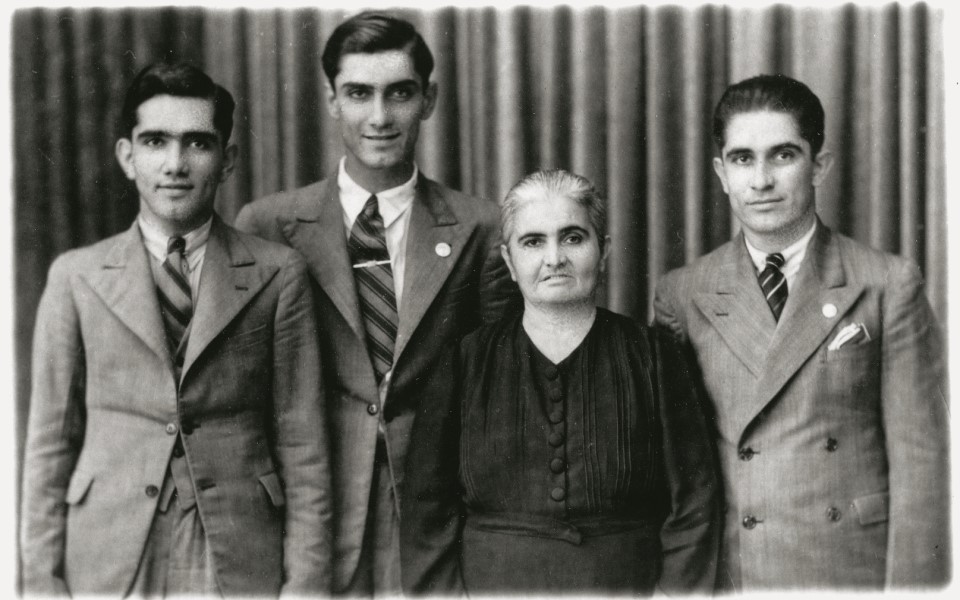
Do you remember your first visit?
Of course. I had goosebumps, and even as I talk about it now, I still get tingles. Nothing prepares you for the beauty of the harbor, the colorful houses and the ruins of the old fort on top of the hill, or climbing the steps at the back of the hill, or the town itself and the walk along the seafront where the restaurants are.
I remember coming on a little fishing boat from Turkey with my new bride, my wife for 37 years now, as we headed to the island on our very first trip. We were touring Europe on our honeymoon, and on Kastellorizo we were greeted by my uncle and my aunt, Archie and Marian Mitaros. They showed us around and Archie took us to the old monastery on the top of the mountain. Their relationship to the island impressed me. I was also impressed by the locals with their friendliness and their helpfulness.
This was before I became well known, before anyone knew who I was, and nobody had to treat me special, but they did. Just like a long-lost son. The Kastellorizian diaspora of Australia is unique, in the sense that it’s so closely knit, and so connected to the island.
In Australia, there are many diaspora groups from Greek islands – Kalymnians, Kytherans, Rhodians, Cretans and more. But Kastellorizians take it to another level. We have been given DNA from our forebears that is, of course, Greek, but that’s uniquely Kastellorizian as well. We’re fighters, we’re survivors, hard workers, we’re loyal, we’re respectful and we get things done, and these are attributes that are treasured in the Western world. What’s more, I think we bond well together; you know, the judgment often made of the Greeks is that we don’t work well together, and maybe there’s some truth to that, but Kastellorizians do work well together.
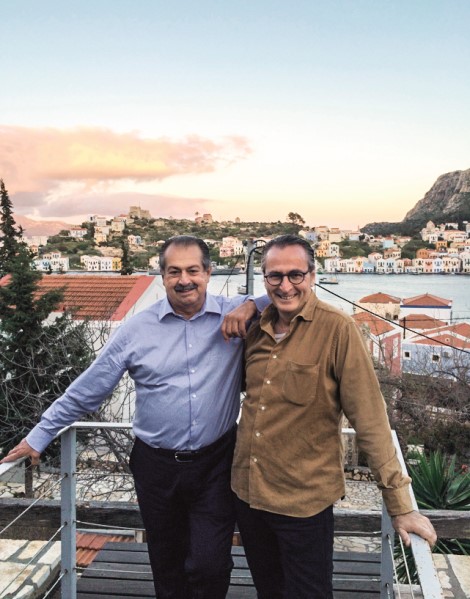
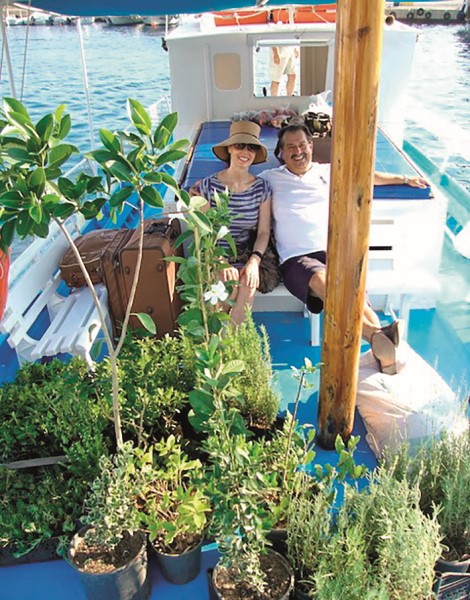
On the one hand, we have a romantic-heroic narrative regarding Kastellorizo, and on the other, there are the facts as they are: incomes and even groceries come mostly from Turkey, there are problems finding even basic medicines, poor educational resources, and the island is 100% dependent on seasonal tourism. What can be done to change this?
The century since the dissolution of the Ottoman Empire and the earthquake of 1926 has been witness to the depopulation and degradation of Kastellorizo. I think the most important step is to stabilize first, and then grow as a result. Unfortunately, the population is too small; the schools on the island are not very good; people have to send their kids to Rhodes for further education of any quality; and there is little in the way of medical support on the island. If you come down with something serious, you have to leave the island for treatment.
The one good thing that the island does have, thanks to the Greek ferry system, is transport; you can get on and off it, although not very easily. In general, however, the island lacks basic infrastructures and basic services. To improve things, the welfare of the island has to be made a national priority.
The two things that have to be done, and from my end I’m certainly very willing to help make them happen, are that the Kastellorizian diaspora has to know that they can be part of the solution, while the people on the island need to understand that it’s not a takeover; it’s your cousins and uncles and brothers and sisters from a long way away, and they’re here to help you. And it’s not just about writing checks, it’s actually about helping to build more effective systems – the hospital, the airport, and wastewater treatment facilities.
There has to be philanthropy behind this, but it has to be coupled with a very strong statement from the Greek government that Kastellorizo matters. It’s not just about holding state visits or making a show of solidarity, it’s stating this is our border, the border of our country, and that Greece is going to help it with its infrastructure, make it a part of the Greece that we all know, and help it get the kind of effective tourism that won’t harm it. And this two-pronged approach, attention from the government and attention from individuals from the diaspora, will not only help stop people from leaving the island, but should make them start coming back. We can do that and, frankly, we can do it in cooperation with our Turkish neighbors.
The relationship with Kaş is very strong. But we have to give it the priority I just talked about.
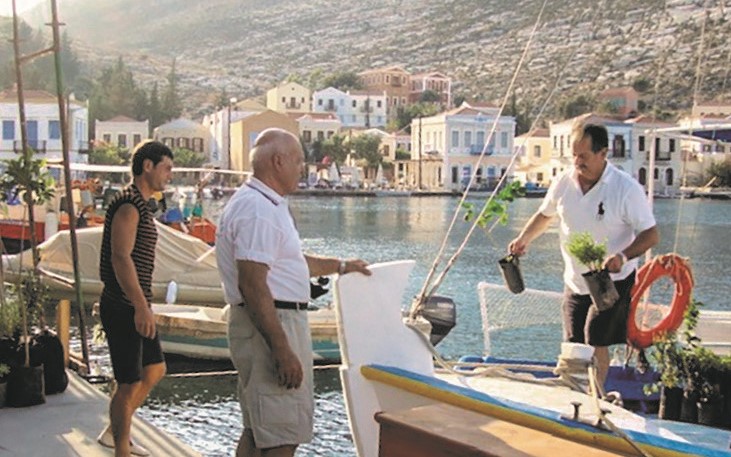
If you were to advise the Greek government on how to help Kastellorizo, where would you start?
In a time of crisis, when the economic depression is so severe that it doesn’t look like the economy will bounce back in a hurry, you have to borrow money in order to spend money on public infrastructure works. You have to create an investment stimulus. It’s the right time to fix the port, to fix the airport and the reservoir. I’d allocate the money from the national treasury, get EU funds for green infrastructure, and put up a green power plant on the island using solar. I’d get rid of the diesel-fired power stations, make the island carbon-friendly, and put some windmills to harness wind power, all infrastructure investment to stimulate the economy.
Last but not least… Tell me about your favorite summer rituals when on Kastellorizo. How do you spend your days?
On Kastellorizo, I just want to slow down, because I’m in a hurry everywhere else. Here it’s about taking it slowly, enjoying a swim, and meeting up with others for a coffee, an ouzo or a meal. A walk to the grocery store and a conversation with the owner, seeing friends that I haven’t seen for a while, going out on hikes with my wife: that’s what I want to do.
One of our favorite things is to wake up early in the morning, go down to our friends who own one of the restaurants, either Irini at Little Paris, or Barbara at Barbara’s Cafe, and either Irini’s father Giorgio or Barbara’s husband Kyriakos will take us on their little boat to the islet of Aghios Georgios. There, we’ll have a swim in the beautiful clear water and then a nice relaxing little breakfast, complete with Greek coffee in the small kafeneio on the island owned by Tsikos and his lovely Turkish wife. Before noon, we’re back on the boat and headed to our house to sit on the veranda, read a book, enjoy the breeze, and watch the goats who wander in from the backyard and try to eat our garden plants. It’s a nice easy way to get reacquainted with an environment that’s so welcoming.
I bet you’re obliged to have a meal in every taverna, so no one complains!
Of course. I’m too well known on the island to slip by unnoticed, so I have to make sure I don’t upset anyone!

